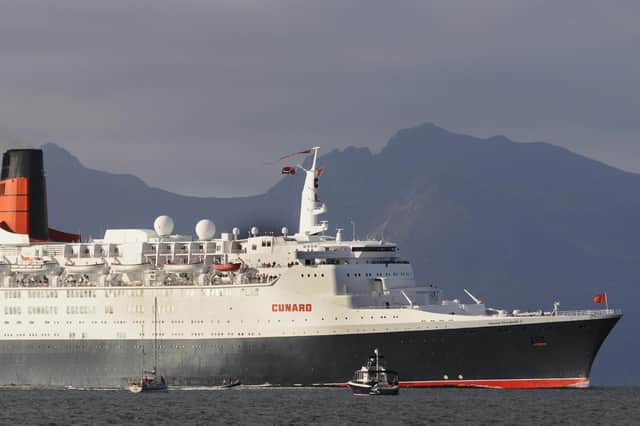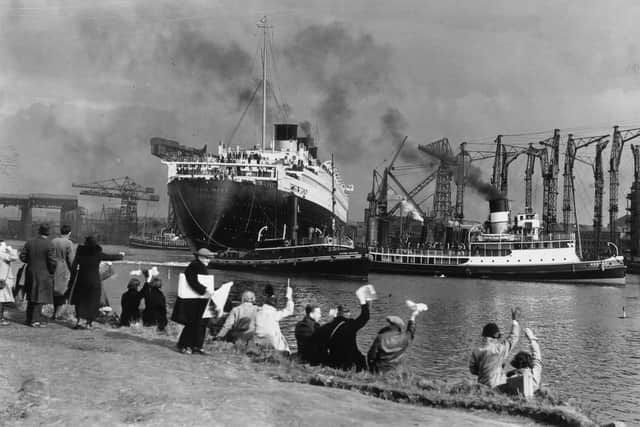Climate change: Scotland's North Sea oil workers cannot be allowed to suffer the same fate as Clyde shipbuilders – Christine Jardine MP


What was still then known simply as the Q4, her Cunard line ‘codename’, was to be named by Her Majesty the Queen on September 20 and I would be there.
I had spent my first few years growing up in the shadow, literally, of the massive hull of the ship which became the world’s most glamorous cruise liner: the QE2.
Advertisement
Hide AdAdvertisement
Hide AdIt dwarfed much of the town, looming over the tenements along the road which bordered the shipyard. What few of us knew then was that it would be the last great launch.
The departure of the QE2 left in its wake an employment black hole and set a pattern for industrial decline which we would do well to recognise as we manage the closure of our North Sea industries.
There are currently around 70,000 people employed directly in the sector across Scotland – almost three per cent of our total workforce.
Surely what we mustn’t allow is another generation to be discarded as thoughtlessly as the communities dependent on shipbuilding, coal mining or steel production were.
Oil may now be the climate’s enemy, but it has been our economic support and can be an ally as we move on to a greener future.


Managing fossil fuel’s decline can work best for all of us, if it goes hand in glove with using both that technical know-how and the drive of the operators for growth as tools in the transition.
There can surely be few of us who have not recognised both the climate imperative and public demand for that change to be achieved quickly.
If anyone were in any doubt, I would point them toward my email inbox.
Advertisement
Hide AdAdvertisement
Hide AdAlthough Covid, Brexit and other individual issues have been major concerns, none of them have generated the same constant conversation across the age groups as the fear for the future of the planet.
Over the summer the flooding we have seen close to home, pictures of unprecedented wildfires in north America and the storms which have hit that continent’s East coast have acted as a reinforcement of the importance of this autumn’s United Nations’ Cop26 climate summit in Glasgow.
We have already, as a country, begun to move a considerable way towards a greener future with the development of wind, wave, tidal, solar and hydrogen alternatives.
At the forefront of that is Emec – the European Marine Energy Centre – on Orkney, a mere ten miles or so as the crow flies, or so I am told, from the Flotta Oil Terminal.
And geographical proximity of the old and new should be reflected in our strategy for the future.
Indeed at the Scottish Parliament’s most recent net-zero, energy and transport committee meeting, the potential for working with the oil and gas industry was underlined by Professor Jim Skea.
He is professor of sustainable energy at Imperial College London and a member of the UK government’s Committee on Climate Change
He pointed to the fact that there are what he called “skills and competences” in the oil and gas sector that can be redeployed to assist us towards a low-carbon economy.
Advertisement
Hide AdAdvertisement
Hide AdSpecifically, they have expertise in “getting corrosive liquids and gases through pipes, managing the geology under the surface and managing big, complicated, risky technical projects”. As we move to a low-carbon economy that sort of technical skill will be vital.
The industry itself is keen to express its commitment to the Scottish government’s net-zero goals by 2045 and has set targets to make its own products greener and cleaner.
It is after all in its own interests to rebrand and move to new fuels to continue to prosper. So the potential is there. We must continue to harvest it.
There are those who would argue against and say that we must pull the plugs on the fossil fuel sector immediately.
But until we have shifted demand further from fossil fuel-powered vehicles and can meet the demand for power from sustainable energy alone, we would still have to import oil.
That is the challenge. To shift demand away from fossil fuels to the renewables in every area of life.
Make no mistake, I want to see us investing in homes and public transport, electrifying Britain’s railway, planting trees and restoring the UK’s peatlands to absorb emissions and improve biodiversity. Firing-up progress to UK net-zero to help businesses become global leaders in key future technologies and creating a bold and ambitious green industrial strategy.
But we must do everything that we can to minimise the negative social impact.
Advertisement
Hide AdAdvertisement
Hide AdWhen I go back to Clydebank now it is a very different place. Brighter, cleaner and proud of its industrial heritage. But it has come at a price and taken decades to recover.
I was at that launch in 1967 because my Mum worked part-time in John Brown’s when the QE2 was being built. When shipbuilding ended, it became Marathon, built oil rigs, and the North Sea for a while offered an alternative. That too is long gone.
Later this autumn we will have the chance to show the world the progress that we have already made towards that just transition to renewable energy and a green economy when its leaders gather for Cop26 in Glasgow.
But we should take time to glance along the River Clyde and remember that there may also be a heavy price to pay if we do not use the lessons of our past.
Christine Jardine is the Scottish Liberal Democrat MP for Edinburgh West
A message from the Editor:
Thank you for reading this article. We're more reliant on your support than ever as the shift in consumer habits brought about by coronavirus impacts our advertisers.
If you haven't already, please consider supporting our trusted, fact-checked journalism by taking out a digital subscription.
Comments
Want to join the conversation? Please or to comment on this article.
